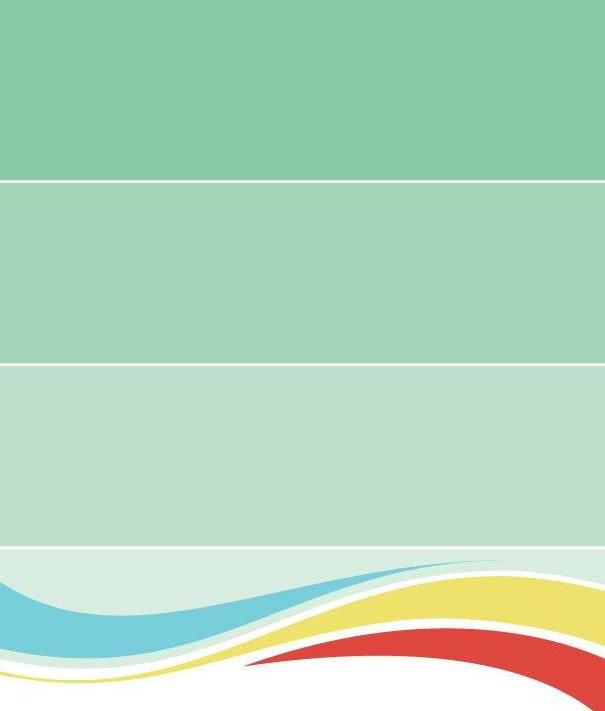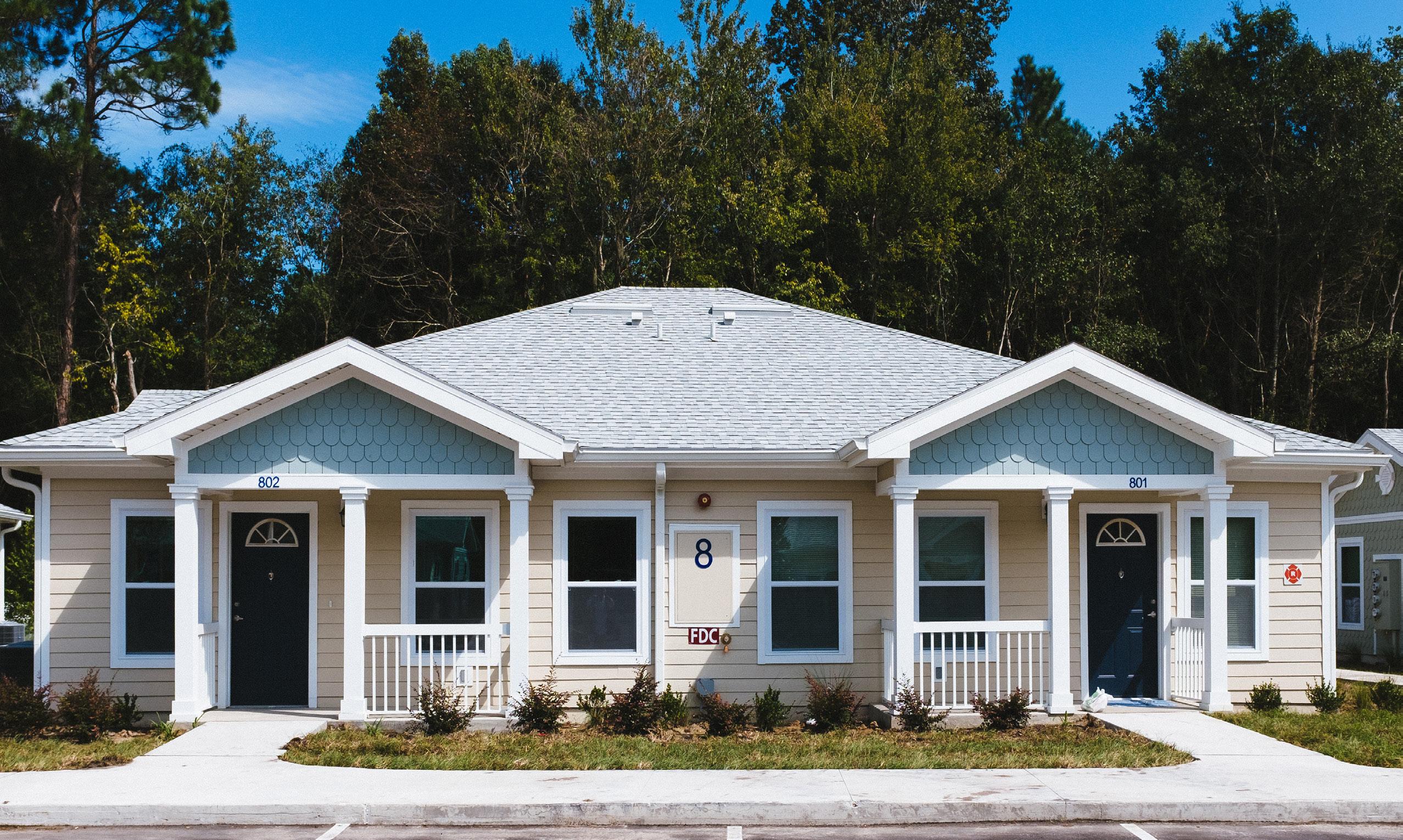
9 minute read
Appendix A: Housing Stabilization: A Framework to Serve Residents with High Needs in Supportive Housing
In the literature, “housing stability” is often referred to as a finite set of activities to help a new resident stabilize in their home. Housing stability is typically discussed as a best practice to support chronically homeless veterans or others who may not be familiar with how to settle into a new home after living on the streets. “Tenancy supports” are those actions taken to promote housing stability. Through work on this pilot, Florida Housing concludes that housing stability should be thought of as a broader, overarching framework to encourage success for chronically homeless persons moving into supportive housing. The objective of housing stability is to help residents both obtain and maintain permanent homes. To succeed with this deceptively simple objective, however, requires a range of partners (and funding) working hand in hand across a spectrum of housing and community-based services. For a person to maintain true stability in their housing, they must not only understand the basics of keeping house, their personal lives must also be stable, with whatever behavioral and other supports are needed to help them achieve this.
Therefore, Florida Housing believes a housing stability approach should include tenancy supports, traditional community-based supportive services and additional critical supports when working with residents with high needs (in addition to housing). To ensure that these services are provided within an integrated framework, we believe there are key clinical tenets that should be implemented to support these residents. Underlying this entire approach is the notion that these services are resident-centered – that is, the residents being served are equal partners in planning, developing and monitoring these supports and services to help make sure they meet their needs.
These services should also be voluntary. A resident that is in compliance with the lease for their rental housing should not be at risk for not participating in services. But services must always be available and offered to residents so when they are at risk of violating their lease, they have the supports necessary to maintain their housing. The pilot sites found that the control residents have of their participation in services is an important part of the services being person-centered. This appendix provides a list of common tenancy supports, a list of traditional and more intensive supportive services provided to residents in supportive housing and key tenets in the clinical housing stability framework.
Tenancy Supports Housing stability work generally begins prior to leasing to assist with eligibility requirements for the housing and prepare people for moving in. No matter what other services are provided at movein, tenancy supports must begin immediately with an initial needs assessment and development of a Housing Stability Plan within the first 30 days of residency. Tenancy supports generally include: • Early identification and intervention for behaviors that may jeopardize housing. • Education about resident and landlord rights and responsibilities. • Eviction prevention planning and coordination. • Coaching on developing/maintaining relationships with landlords/property managers. • Assistance resolving disputes with landlords and/or neighbors. • Advocacy/linkage with community resources to prevent eviction.
• Training on independent living skills, such as cleaning, laundry, shopping, household budgeting and management, financial literacy, including credit repair. • Assistance with housing recertification process. • Review/modification of housing support plan and eviction prevention plan with resident. • Role modeling in such areas as apartment community living, communication with neighbors, sober fun. • Home visiting.
Traditional Supportive Services • Assistance with completing SOAR applications, support to obtain (or reinstate) all eligible entitlement benefits, such as Social Security, VA benefits and food stamps and SOAR case management. • Referrals to needed services such as mental health, substance use treatment and recovery support, medical and preventive health care and other wellness services.
• Referrals and information about community services such as places of worship, community centers, food pantries, community-based support groups such as NA/AA, and other groups specific to areas of interest. • Employment services to increase financial independence and increase opportunities for employment. • Education support services with the focus on completing degree or diploma technical or language skills.
• Transportation services such as access to transit passes and other personal transport services. • Community activities designed to decrease isolation, develop community mindset and strengthen “good neighbor” actions and behaviors.
• Re-establishing identity for those who lost identification cards.
• Financial support for medical expenses not covered by insurance or interim assistance pending benefits such as prescriptions and non-durable medical expenses. • Legal services to assist with outstanding warrants, expunging records and getting residents folks out of jail if arrested.
Additional Critical Supports for Persons Who Are High Utilizers of Public Services
• Health and behavioral health care services, including medication management. • Nurse case management on site. • Targeted case management for folks who have Medicaid or other insurance.
• Funding or access to items to meet all personal needs including personal hygiene, clothing, food, essential for household not covered under food stamps. • Access to crisis intervention teams such as FACT (Florida
Assertive Community Treatment) or ACT (Assertive
Community Treatment) teams. • On-site therapeutic services.
Key Tenets in the Clinical Framework for Supporting High Utilizers
When working with residents with high needs, the clinical framework in which these supports are provided includes the following approaches: Housing Stability Resident Services Coordinators – Housing Stability Resident Service Coordinators work on site with residents to ensure long-term housing sustainability by developing a housing stability plan; focusing on tenancy supports, such as interacting positively with landlords and neighbors; coordinating services to respond to behaviors that may accompany mental illness or substance use so that they don’t interfere with success in housing; developing crisis plans as needed; connecting with appropriate community resources; and supporting residents’ individual housing goals. Full-time coordinators should have low caseloads – between 15-20 adult residents per coordinator, depending on whether residents have just moved in or are becoming stabilized. If Resident Services Coordinators are to serve residents on site at multiple properties, their caseloads should be no more than oneto-15 residents to ensure adequate resident support. Pilot leaders recommend strong qualifications for these coordinators due to the range of duties they have, as well as knowledge and experience with strategies such as trauma informed care, harm reduction, motivational interviewing, critical time Intervention and Housing First practices. Qualification should include a bachelor’s degree in social work, mental health, psychology or related field required, and a minimum of three years related field experience. A detailed position description used by the Miami-Dade pilot based on what was learned in this pilot is provided at the end of this appendix. Housing First – Under Housing First, permanent housing is provided without conditions. This means that properties accept residents without prior requirements for sobriety, compliance with medications or participation in programs. After the resident has moved in, properties following Housing First limit lease terminations to severe lease violations and only after strenuous efforts to resolve any problems, along with continuing services to assure housing stabilization in the resident’s unit.
This approach prioritizes providing permanent housing to people experiencing homelessness, thus allowing people to attend to basic necessities like food and a place to live before attending to anything less critical, such as getting a job, budgeting properly, or attending to substance use issues.
Motivational Interviewing – A counseling method that helps people resolve ambivalent feelings and insecurities in order to find the internal motivation they need to change their behavior, often used to address addiction and the management of physical health issues.
Trauma Informed Care – An approach to supporting clients that is grounded in an understanding of and responsiveness to the impact of past and current trauma that emphasizes physical, psychological, and emotional safety for both providers and survivors, and that creates opportunities for survivors to rebuild a sense of control and empowerment. Recovery Peer Support – Formal peer support workers are people who have been successful in the recovery process who help others experiencing similar situations. Peer support workers help people become and stay engaged in the recovery process and reduce the likelihood of relapse.
POSITION DESCRIPTION Resident Services Coordinator
Job Summary: The Resident Service Coordinator will provide direct supportive services, employment and training support and appropriate referrals for residents on site at Carrfour Support Housing Programs.
Essential Duties/Expectations:
• Engage with residents to collaboratively complete the initial assessment and develop and implement individualized Housing Stability Plans (“HSP”) outlining short term and long-term goals
• Provide services utilizing evidence-based practice in service delivery such as intensive case management, Motivational Interviewing, Harm Reduction,
Trauma Informed Care, Critical Time Intervention and Housing First Practices to assist in obtaining/increasing income, promoting self-sufficiency and housing stability
• Coordinate with community providers to offer additional services in the areas of, but not limited to: housing stabilization, money management, community integration, employment and training, benefits establishment, referrals to community providers for substance use, primary and mental health care, and all other services needed to assist client in reaching their housing stability goals
• Facilitate/teach daily living skills and workshops for residents in groups and individually as outlined on each resident’s HSP
• Conduct scheduled home visits with each resident at the frequency determined in collaboration with the Program Supervisor
• Work in collaboration with the property manager to establish community building activities (resident council, residents’ meetings, etc.), facilitate/ supervise workshops, information sessions to meet residents needs and interests to enhance life skills
• Provide crisis intervention as needed under the supervision of the Clinical
Director or Program Supervisor
• Maintain all client records and information in accordance with our policies
• Ensure compliance with HMIS and timely data entry into Service Point
• Complete all documentation, paperwork in a timely and efficient manner
• Actively participate in quarterly (at a minimum) staffing to address resident progress towards HSP goals and update as needed • Actively participate in weekly/monthly supervision
• Attend scheduled workshops, trainings and meetings as required
• Cross train across all programs/departments to ensure success of Carrfour
Supportive Services
• Other duties as assigned to support and ensure the success of the program
• Reports to Program Supervisor
Skills:
• Understanding of working directly with formerly homeless individuals and families and at-risk populations by treating all individuals with respect and are able to build rapport by promoting empathy and compassion with patience and consistency
• Pays close attention to detail and demonstrates strong organization skills
• Strong critical thinking skills and ability to problem solve
• Effective communication skills backed by detailed written documentation and comprehensive listening skills
• Maintains a professional demeanor and maturity, good judgment, quick learner, and proactive
• Ability to multi-task, prioritize and manage time efficiently
• Highly proficient in Excel, Adobe, Microsoft programs, Outlook, and understanding of database applications, including the use of formulas, functions, data import/export and creating charts
Minimum Requirements Education/Experience:
• Bachelor’s degree in social work, mental health, psychology, or related field required and a minimum of three years related field experience
• Individuals who do not possess a Bachelor’s Degree will be required to have a high school diploma or equivalent and a minimum of five years related field experience and may be required to become certified as a Behavioral
Health Technician
• Knowledge of community resources
• Must have a valid driver’s license and reliable transportation
• Ability to work a flexible schedule and be on-call as needed
• Bilingual (English/Spanish or Creole/English) preferred









